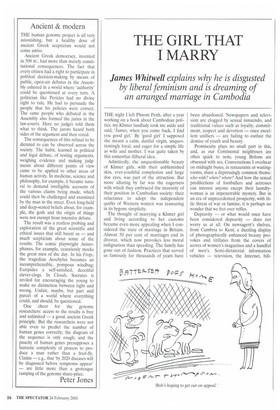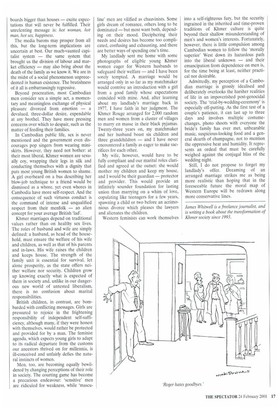THE GIRL THAT I MARRY
James Whitwell explains why he is disgusted
by liberal feminism and is dreaming of an arranged marriage in Cambodia
THE night I left Phnom Penh, after a year working on a book about Cambodian politics, my Khmer landlady took me aside and said, 'James, when you come back, I find you good girl.' By 'good girl' I supposed she meant a calm, dutiful virgin, unquestioningly loyal, and eager for a simple life as wife and mother. I was quite taken by this somewhat illiberal idea.
Admittedly, the unquestionable beauty of Khmer girls, with their unblemished skin, ever-youthful complexion and large doe eyes, was part of the attraction. But more alluring by far was the eagerness with which they embraced the necessity of their position in Cambodian society: their reluctance to adopt the independent quirks of Western women was reassuring in its bygone simplicity.
The thought of marrying a Khmer girl and living according to her customs became even more appealing when I considered the state of marriage in Britain. Almost 50 per cent of marriages end in divorce, which now provokes less moral indignation than speeding. The family has gone out of fashion. Practices that served us famously for thousands of years have been abandoned. Newspapers and television are clogged by sexual innuendo, and traditional values such as loyalty, commitment, respect and devotion — once excellent unifiers — are failing to outlast the demise of youth and beauty.
Promiscuity plays no small part in this, and, as our Continental neighbours are often quick to note, young Britons are obsessed with sex. Conversations I overhear on midnight buses, in restaurants or waitingrooms, share a depressingly common theme: who with? when? where? And how the sexual predilections of footballers and actresses can interest anyone except their laundrywoman is an impenetrable mystery. But in an era of unprecedented prosperity, with little threat of war or famine, it is perhaps no wonder that we fret over trifles.
Depravity — or what would once have been considered depravity — does not worry us at all. On newsagent's shelves, from Cumbria to Kent, a dazzling display of photographically enhanced beauty provokes and titillates from the covers of scores of women's magazines and a handful of men's. Semi-dictatorial information vehicles — television, the Internet, bill
boards bigger than houses — excite expectations that will never be fulfilled. Their unrelenting message is: hot woman, hot man, hot sex, happiness.
The media barons may prosper from all this, but the long-term implications are uncertain at best. Our much-vaunted capitalist system — the same system that brought us the division of labour and market efficiency — may also bring about the death of the family as we know it. We are in the midst of a social phenomenon unprecedented in human existence. The brutishness of it all is embarrassingly regressive.
Beyond procreation, most Cambodian men consider sex a simple act, a momentary and meaningless exchange of physical pleasure divorced from emotion — a devalued, three-dollar desire. expendable at any brothel. They have more pressing concerns over which to despair, such as the matter of feeding their families.
In Cambodian public life, sex is never mentioned and the government even discourages pop singers from wearing miniskirts. However, they need not bother: at their most liberal, Khmer women are sexually coy, wrapping their legs in silk and conducting themselves with a dignity that puts most young British women to shame. A girl overheard on a bus describing her blow-job technique to a friend would be dismissed as a whore, yet even whores in Cambodia have more self-respect. And the consequence of such virtuous conduct is the command of intense and unqualified respect from their menfolk — an alien concept for your average British 'lad'.
Khmer marriages depend on traditional values rather than on healthy sex lives. The roles of husband and wife are simply defined: a husband, as head of the household, must ensure the welfare of his wife and children, as well as that of his parents and in-laws. His wife raises the children and keeps house. The strength of the family unit is essential for survival, let alone prosperity, as the state offers neither welfare nor security. Children grow up knowing exactly what is expected of them in society and, unlike in our dangerous new world of untested liberalism, there is no confusion about marital responsibilities.
British children, in contrast, are bombarded with conflicting messages. Girls are pressured to rejoice in the frightening responsibility of independent self-sufficiency, although many, if they were honest with themselves, would rather be protected and provided for by a man. The feminist agenda, which expects young girls to adapt to its radical departure from the customs our ancestors thrived on for millennia, is ill-conceived and unfairly defies the natural instincts of women.
Men, too, are becoming equally bewildered by changing perceptions of their role in society. The courting game has become a precarious endeavour: 'sensitive' men are ridiculed for weakness, while 'mascu
line' men are vilified as chauvinists. Some girls dream of romance, others long to be dominated — but most want both, depending on their mood. Deciphering their needs and desires has become too complicated, confusing and exhausting, and there are better ways of spending one's time.
My landlady sent me home with some photographs of eligible young Khmer women eager for Western husbands to safeguard their welfare — and I have been sorely tempted. A marriage would be arranged only in so far as my matchmaker would contrive an introduction with a girl from a good family whose expectations coincided with mine. And, after learning about my landlady's marriage back in 1977, I have faith in her judgment. The Khmer Rouge arranged for 2,000 random men and women from a cluster of villages to marry en masse in their black pyjamas. Twenty-three years on, my matchmaker and her husband boast six children and three grandchildren — and I have never encountered a family as eager to make sacrifices for each other.
My wife, however, would have to be fully compliant and our marital roles clarified and agreed at the outset: she would mother my children and keep my house, and I would be their guardian — protector and provider. This would provide an infinitely sounder foundation for lasting union than marrying on a whim of love, copulating like teenagers for a few years, spawning a child or two before an acrimonious divorce which pleases the lawyers and alienates the children.
Western feminists can work themselves into a self-righteous fury, but the security ingrained in the inherited and time-proven traditions of Khmer culture is quite beyond their shallow misunderstanding of men's and women's interests. Fortunately, however, there is little compulsion among Cambodian women to follow the 'morally superior' West down its hazardous path into the liberal unknown — and their emancipation from dependence on men is, for the time being at least, neither practical nor desirable.
Admittedly, my perception of a Cambodian marriage is grossly idealised and deliberately overlooks the harsher realities of life in an impoverished post-genocidal society. The 'trial-by-wedding-ceremony' is especially off-putting. As the first test of a couple's patience, it can last up to three days and involves multiple costumechanges, photo shoots with everyone the bride's family has ever met, unbearable music, suspicious-looking food and a general dearth of champagne, not to mention the oppressive heat and humidity. It represents an ordeal that must be carefully weighed against the conjugal bliss of the wedding night.
Still, I do not propose to forget my landlady's offer. Dreaming of an arranged marriage strikes me as being more realistic than hoping that in the foreseeable future the moral map of Western Europe will be redrawn along more conservative lines.
Tames Wlzitwell is a freelance journalist, and is writing a book about the transformation of Khmer society since 1993.



































































 Previous page
Previous page